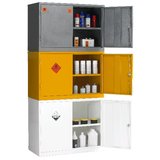 When you talk about hazardous materials and chemical storage, people tend to think of the large, major fires and explosions that make headline news. The Flixborough explosion in 1974 killed 28 people and injured a further 36. It was this disaster that prompted the foundation for today’s legislation that controls the use and storage of hazardous materials.
When you talk about hazardous materials and chemical storage, people tend to think of the large, major fires and explosions that make headline news. The Flixborough explosion in 1974 killed 28 people and injured a further 36. It was this disaster that prompted the foundation for today’s legislation that controls the use and storage of hazardous materials.
But despite extensive legislation there are numerous incidents every year that could have been prevented, which proves that safe hazardous materials practices are still lacking. Earlier this year, a refrigeration company in Grays, Essex was fined £22,500 after an incident in 2012 where a drum of paint thinners caught fire.
It’s easy to think that only large laboratories or manufacturing plants use hazardous materials. But potentially dangerous chemicals are in daily use by all sorts of different organisations. For example, cleaning companies, swimming pools, school laboratories and even farms use hazardous materials, and must all comply with the CoSHH legislation (Control of Substances Hazardous to Health Regulations).
Correct storage of hazardous materials is essential, of course. But so is staff training to ensure the necessary safety procedures are observed. All too often staff are unaware of the potential risks involved, take short cuts because they’re rushed, or don’t comply with the correct precautions.
Understandably perhaps, one of the biggest sources of accidents involving hazardous substances is in school and colleges. In this environment, young, inexperienced and relatively untrained students are handling dangerous substances, often with disturbing results. You don’t have to look far to find examples like these:
- Five fire crews with breathing apparatus attended an incident at a school in Tiptree, Essex when two 17-year-olds spilled phenol crystals on their arms.
- In Northampton, two school maintenance workers were taken to hospital after a spill that was believed to be caused by chemicals in the school’s swimming pool plant room.
- Twelve people needed medical treatment at a school in Birmingham after a chemical spill.
- A student at Edinburgh university was taken to hospital after an accident when benzyl bromide came into contact with water. Fortunately, he was wearing a mask and observing the correct safety procedures, but twenty firefighters and seven fire engines attended the scene.
Storage of chemicals in appropriate CoSHH complaint cabinets is just one of the many precautions necessary to eliminate chemical accidents. It’s my belief that we need greater awareness and education if we’re to prevent more major disaster headlines.

